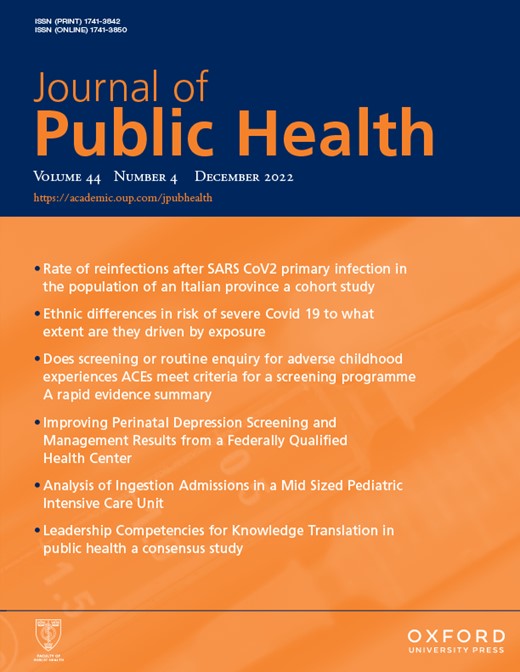-
PDF
- Split View
-
Views
-
Cite
Cite
Jed Martin Tingson, Agnes M Brazal, Spirituality of hopeful risk-taking (Bahala na) among Filipino healthcare workers, Journal of Public Health, Volume 44, Issue 4, December 2022, Pages e656–e657, https://doi.org/10.1093/pubmed/fdab393
Close - Share Icon Share
Abstract
Mental health problems are prevalent among medical frontliners, as demonstrated in the study by Ghaleb et al. in the case of the Eastern Mediterranean Region. As mental health can be strengthened by spirituality, this study probed into the spirituality of bahala na of overseas Filipino health care workers.
A phenomenological research was conducted that includes an interview of 17 Filipino Catholic migrant nurses in five countries, on the situations when they find themselves exclaiming “bahala na” in their work as frontliners, and what this means for them.
Affirming the notion of bahala na as an expression of hopeful risk-taking, the study showed that the nurses usually exclaim bahala na when they have done everything in their power in a given situation and they are now leaving the rest to God. The spirituality of bahala na helped the nurses face the stresses brought about by the pandemic, and when tapped, can further aid them in fighting against institutional racism to promote health equity in the medical community.
A multi-country cross-sectional study by Ghaleb et al. in nine countries in the Eastern Mediterranean Region published in this journal has shown the prevalence of mental health problems such as depression, stress and anxiety among health care workers (HCW) attending to Covid 19 in the Eastern Mediterranean region. It proposed the need to provide assistance to foster mental well-being among health care frontliners.1
Tapping the spirituality of HCW workers can have a positive impact on their mental health. The Philippines is the largest exporter of nurses worldwide.2 In an interview with 17 Filipino migrant Catholic nurses from Canada, New Zealand, Singapore, US and UK, the spirituality of hopeful risk-taking (bahala na) emerged as a factor that helps them deal with the stresses brought about by the pandemic.
Most of the respondents have decided to work abroad for the sake of their family to whom they regularly send money. Battling with homesickness, these HCW faced various stressors: the risk of contracting the virus with the inadequate supply of masks and personal protective equipment (PPE) and exhausting workload especially during the initial pandemic surge; discrimination due to people’s fear of them as possible transmitters of the virus; and their own fears that they may transmit the virus to their families especially if they are staying in overcrowded housing.
The migrant HCW respondents deal with such situations with their bahala na (come what may) spirituality: in deciding to come to a foreign land to work; in continuing with their care work when they do not feel safe even if they are fully clad with their PPE or when they lack sleep or rest and are therefore more susceptible to the virus, when they face discrimination from the community as HCW and when they feel they have given their all and there is nothing else they can do about the situation.
Western-oriented social scientists in the Philippines in the 1960s interpreted the bahala na attitude of Filipinos as fatalistic resignation. This is, however, a misreading of this attitude. Bahala na, as the Filipino theologian Jose de Mesa pointed out, is more a ‘hopeful risk-taking’.3
It requires the virtue of fortitude in its two acts: agredi (risk-taking) and sustinere (endurance). Ultimately, bahala na for most of the respondents is an expression of trust in Divine Providence. As one of the nurses expressed, ‘God, please take over’ while another adds, ‘when tough times come, have no fear and face the consequences without stopping to pray’. This is not just letting God do the work while they wait for the solution to come down from heaven. It is doing everything in one’s power in a given situation and then leaving the rest to God.
The lived spirituality of hopeful risk-taking of Filipino migrant HCW, together with the support of their families, has helped them endure this pandemic that has been going on for almost two years now.
It is important to note, however, that Filipino nurses are disproportionately represented among those who died due to Covid 19 both in the USA (30.1%) and the UK (22%).4 This is said to be due to institutionalized racism where migrants normally get assigned to higher risk environment and the Filipinos’ difficulty—because of their visa status—in saying ‘no’ even if they are put on harm’s way.5
Hopefully, the bahala na spirituality of Filipino HCW will be channeled to strengthen them as well in their fight against institutionalized racism to promote health equity in the medical community.6
References
Written evidence submitted by the Filipino UK Nurses Association (MRS0431) https://committees. parliament.uk/ writtenevidence/3805/pdf/



